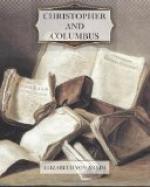“Very well,” said Anna-Felicitas. “I’ll be Christopher.”
“No. I’ll be Christopher,” said Anna-Rose.
“Very well,” said Anna-Felicitas, who was the most amiable, acquiescent person in the world. “Then I suppose I’ll have to be Columbus. But I think Christopher sounds prettier.”
Both rolled their r’s incurably. It was evidently in their blood, for nothing, no amount of teaching and admonishment, could get them out of it. Before they were able to talk at all, in those happy days when parents make astounding assertions to other parents about the intelligence and certain future brilliancy of their offspring, and the other parents, however much they may pity such self-deception, can’t contradict, because after all it just possibly may be so, the most foolish people occasionally producing geniuses,—in those happy days of undisturbed bright castle-building, the mother, who was English, of the two derelicts now huddled on the dank deck of the St. Luke, said to the father, who was German, “At any rate these two blessed little bundles of deliciousness”—she had one on each arm and was tickling their noses alternately with her eyelashes, and they were screaming for joy—“won’t have to learn either German or English. They’ll just know them.”
“Perhaps,” said the father, who was a cautious man.
“They’re born bi-lingual,” said the mother; and the twins wheezed and choked with laughter, for she was tickling them beneath their chins, softly fluttering her eyelashes along the creases of fat she thought so adorable.
“Perhaps,” said the father.
“It gives them a tremendous start,” said the mother; and the twins squirmed in a dreadful ecstasy, for she had now got to their ears.
“Perhaps,” said the father.
But what happened was that they didn’t speak either language. Not, that is, as a native should. Their German bristled with mistakes. They spoke it with a foreign accent. It was copious, but incorrect. Almost the last thing their father, an accurate man, said to them as he lay dying, had to do with a misplaced dative. And when they talked English it rolled about uncontrollably on its r’s, and had a great many long words in it got from Milton, and Dr. Johnson, and people like that, whom their mother had particularly loved, but as they talked far more to their mother than to their father, who was a man of much briefness in words though not in temper, they were better on the whole at English than German.
Their mother, who loved England more the longer she lived away from it,—“As one does; and the same principle,” Anna-Rose explained to Anna-Felicitas when they had lived some time with their aunt and uncle, “applies to relations, aunts’ husbands, and the clergy,”—never tired of telling her children about it, and its poetry, and its spirit, and the greatness and glory of its points of view. They drank it all in and believed




